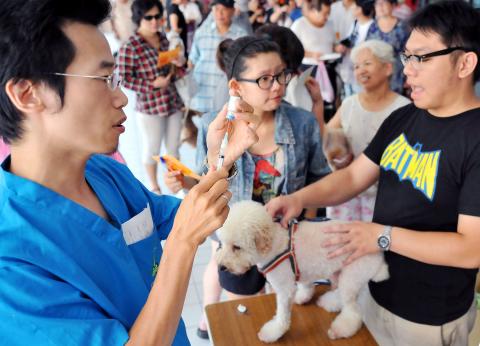An Asian house shrew has been confirmed to have been infected with rabies, the Cabinet’s Council of Agriculture (COA) said last night.
The Asian house shrew, or money shrew, was caught last week in a house in Taitung County. A woman there was first suspected of having been bitten by the animal, but was later found to be free of any bite marks, the council said.
Until the infected shrew, all 14 cases of animal infections had been found in wild Formosan ferret-badgers, covering 12 townships or districts in six counties and cities in central and southern Taiwan, the council said.

Photo: Mandy Cheng, AFP
Since Taiwan reported its first rabies cases on July 16, of the 14 cases involving Formosan ferret-badgers from the mountainous areas, Nantou County has accounted for seven, the council said. Nearby Greater Taichung and Yunlin County have reported one each, while Greater Tainan has reported one and Greater Kaohsiung has reported two. Taitung County has reported two cases so far.
Of the two most recent confirmed cases involving ferret-badgers, one had bitten a nine-year-old girl living in Nantou County’s Renai Township (仁愛).
The girl was vaccinated immediately afterward.
“And since the ferret-badger involved in the biting has been confirmed to be infected, human rabies immune globulin (HRIG) has also been administered to the girl,” Centers for Disease Control (CD) Deputy Director-General Chuang Jen-hsiang (莊人祥) said.
The other case was found in Greater Kaohsiung’s Meinong District (美濃), Chuang added.
Speaking before the shrew had been found to have been infected, CDC Director-General Chang Feng-yee (張峰義) had emphasized that the rabies outbreaks were so far still restricted to a single species, ferret-badgers.
“Since 1999, the year we started to conduct monitoring and surveillance for rabies, no dogs [or cats or bats] have been tested positive for the virus,” Chang said.
The center also reported that during the 24-hour period through 4pm on Monday, 100 more people who have suffered animal bites or scratches have asked for rabies vaccine, raising the total to 245 since July 21. Among them, 115 have been approved to use of the vaccine and 16 to use HRIG.
Bureau of Animal and Plant Health Inspection and Quarantine Director Chang Su-san (張淑賢) said that given that all infected animals have been found in mountainous areas, local authorities will step up their efforts to vaccinate cats and dogs living in the mountains and round up stray dogs and immunize them.
When asked whether the council has considered dropping oral vaccines attached to food as bait to attract wild animals from the air in the mountains to control any outbreak of rabies among wildlife, as the US and some European countries, such as Belgium, France and Germany, have done, she said that the competent authority has to first go through a whole series of evaluations before undertaking such preventive measures, and the measures have not yet been decided.
The World Organization for Animal Health announced on Friday that it has listed Taiwan as a rabies-affected area.
Taiwan had been free of rabies since 1961.
Additional reporting by CNA

SECURITY: As China is ‘reshaping’ Hong Kong’s population, Taiwan must raise the eligibility threshold for applications from Hong Kongers, Chiu Chui-cheng said When Hong Kong and Macau citizens apply for residency in Taiwan, it would be under a new category that includes a “national security observation period,” Mainland Affairs Council (MAC) Minister Chiu Chui-cheng (邱垂正) said yesterday. President William Lai (賴清德) on March 13 announced 17 strategies to counter China’s aggression toward Taiwan, including incorporating national security considerations into the review process for residency applications from Hong Kong and Macau citizens. The situation in Hong Kong is constantly changing, Chiu said to media yesterday on the sidelines of the Taipei Technology Run hosted by the Taipei Neihu Technology Park Development Association. With

CARROT AND STICK: While unrelenting in its military threats, China attracted nearly 40,000 Taiwanese to over 400 business events last year Nearly 40,000 Taiwanese last year joined industry events in China, such as conferences and trade fairs, supported by the Chinese government, a study showed yesterday, as Beijing ramps up a charm offensive toward Taipei alongside military pressure. China has long taken a carrot-and-stick approach to Taiwan, threatening it with the prospect of military action while reaching out to those it believes are amenable to Beijing’s point of view. Taiwanese security officials are wary of what they see as Beijing’s influence campaigns to sway public opinion after Taipei and Beijing gradually resumed travel links halted by the COVID-19 pandemic, but the scale of

A US Marine Corps regiment equipped with Naval Strike Missiles (NSM) is set to participate in the upcoming Balikatan 25 exercise in the Luzon Strait, marking the system’s first-ever deployment in the Philippines. US and Philippine officials have separately confirmed that the Navy Marine Expeditionary Ship Interdiction System (NMESIS) — the mobile launch platform for the Naval Strike Missile — would take part in the joint exercise. The missiles are being deployed to “a strategic first island chain chokepoint” in the waters between Taiwan proper and the Philippines, US-based Naval News reported. “The Luzon Strait and Bashi Channel represent a critical access

Pope Francis is be laid to rest on Saturday after lying in state for three days in St Peter’s Basilica, where the faithful are expected to flock to pay their respects to history’s first Latin American pontiff. The cardinals met yesterday in the Vatican’s synod hall to chart the next steps before a conclave begins to choose Francis’ successor, as condolences poured in from around the world. According to current norms, the conclave must begin between May 5 and 10. The cardinals set the funeral for Saturday at 10am in St Peter’s Square, to be celebrated by the dean of the College